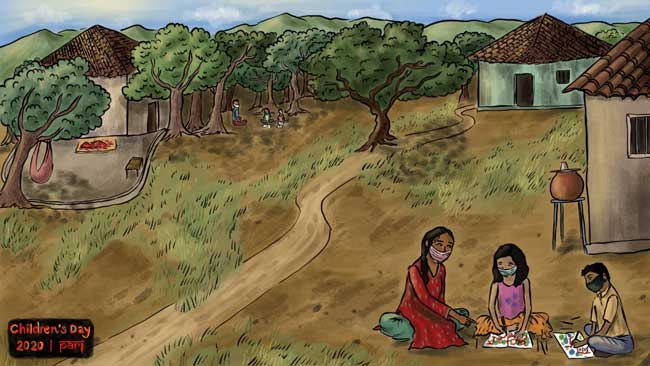
Related posts: how India’s tribal communities cope with the pandemic >>
Covering the human cost of Covid-19
The nationwide Covid-19 lockdown that started on March 25 [2020] has triggered distress for millions of ordinary Indians – stranded migrant workers, farmers, sugarcane cutters, Adivasis, Dalits, sanitation workers, construction labourers, cancer patients staying on city pavements, brick kiln labourers, pastoral nomads, and others. While many are on the brink with no work, income or food, several continue to work amid extremely hazardous conditions | Read about them in these PARI reports from across the country >>
[…] COVID-19 and the lockdown has led to children of migrant workers and daily wage labourers being deprived of food, adding to the burden of families who are not able to make ends meet due to loss of wages. […]
The situation is no better for migrant workers returning to their homes with no means of survival. This further marginalisation makes them fall prey to traffickers for labour. It is a similar situation for children who ran away from home to escape abuse but now are returning to abusive homes in much tougher situations. Our conversations with people in different destinations highlight the fact that human trafficking networks are already active and working under the guise of being benevolent to the vulnerable, desperate families.
The vulnerability of the children of migrant workers has increased manifold during this crisis. Their need for services has gone up, isolation, physical distancing and limited access to child protection response mechanisms and disruption of safety nets has resulted in high susceptibility of children, particularly in tourism locations.
Among them, the condition of trafficked child labourers as well as children living on the streets is even worse. Though there are several relief announcements by the government, there have not been any specific announcements made by the state or central government to mitigate the suffering of children living in difficult circumstances, except the notification by the National Commission for Protection of Child Rights (NCPCR) on the preventive measures that need to be taken in Child Care Institutions.
An adequate assessment of the status of children living in difficult circumstances is less likely to happen during the COVID-19 crisis, as child protection agencies have reduced monitoring to avoid spreading the virus, and police are busy implementing lockdown orders. The situation is dire and uncertain. No one knows how long this will continue and how this will increase child poverty in a country like India.
We need to deal with the realities of their existence rather than ignore these children. […]
Source: “CHILDREN OF MIGRANT WORKERS IN INDIA’S TOURIST SPOTS ARE AT RISK: WHAT THE GOVT CAN DO” – Equations blog by Joyatri Ray Siddhi Pendke, JUNE 15, 2020
URL: https://beta.equitabletourism.org/blog-post/children-migrant-workers-indias-tourist-spots-are-risk-what-govt-can-do
Date visited: 15 July 2020
[Bold typeface added above for emphasis]
Up-to-date reports by Indian journalists and commentators
To search Indian periodicals, magazines, web portals and other sources safely, click here. To find an Indian PhD thesis on a particular tribal community, region and related issues, click here >>
Search tips
Combine the name of any particular state, language or region with that of any tribal (Adivasi) community.
Add keywords of special interest (health, nutrition endangered language, illegal mining, sacred grove); learn about the rights of Scheduled Tribes such as the “Forest Rights Act” (FRA); and the United Nations “Declaration on the Rights of Indigenous Peoples”, “Universal Declaration of Human Rights”, “women’s rights”, or “children’s right to education”.
Specify any other issue or news item you want to learn more about (biodiversity, bonded labour and human trafficking, climate change, ecology, economic development, ethnobotany, ethnomedicine, global warming, Himalayan tribe, hunter-gatherers in a particular region or state, prevention of rural poverty, water access).
For official figures include “scheduled tribe ST” along with a union state or region: e.g. “Chhattisgarh ST community”, “Scheduled tribe Tamil Nadu census”, “ST Kerala census”, “Particularly Vulnerable Tribal Group Jharkhand”, “PVTG Rajasthan”, “Adivasi ST Kerala”, “Adibasi ST West Bengal” etc.
In case the Google Custom Search window is not displayed here try the following: (1) toggle between “Reader” and regular viewing; (2) in your browser’s Security settings select “Enable JavaScript” | More tips >>

Human trafficking is a crime. To report in India, call Shakti Vahini
+91-11-42244224, +91-9582909025 or the national helpline Childline on 1098.
“As per a study on human trafficking, the state of Jharkhand has emerged as India’s trafficking hub with thousands of tribal women and girls being trafficked out of the state each year to Delhi, Punjab, Haryana and beyond [while] human traffickers are also involved in many cases of missing children.” – The Wire | Shakti Vahini | Tourism locations | Adivasi tribal bondage slavery trafficking (Safe search) >>